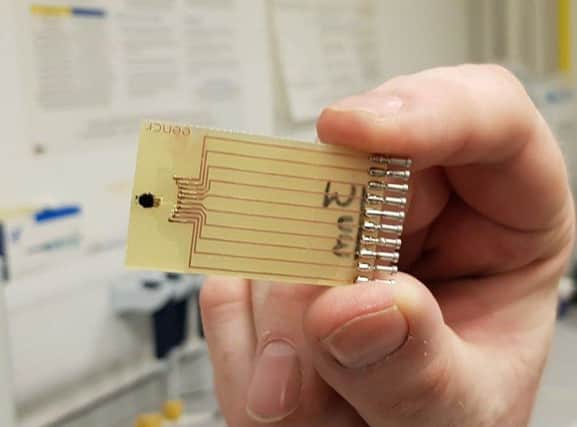New rapid sepsis test by Scottish scientists could save thousands of lives


The test could save thousands of lives from the deadly condition and experts hope it will be available on the NHS within three to five years.
At present, it can take up to 72 hours to diagnose sepsis, which kills an estimated 52,000 people in the UK every year.
Advertisement
Hide AdAdvertisement
Hide AdSepsis hit the headlines following the death of 12-month-old William Mead, from Cornwall, who died in December 2014 after health professionals failed to recognise he had the condition.
The new low-cost test, developed by researchers at Strathclyde University, uses a biosensor device to see whether the protein biomarker interleukin-6 (IL-6) is present in the bloodstream
IL-6 is a molecule secreted by the immune system and is often found in high levels in people with sepsis.
During research at Strathclyde, the new test picked up IL-6 within two and a half minutes.
Advertisement
Hide AdAdvertisement
Hide AdExperts hope the test will be used at the bedside in hospitals and in GP surgeries.
Its needle shape means it can also be implanted and used on patients in intensive care.
Dr Damion Corrigan, from the department of biomedical engineering at Strathclyde, said: “With sepsis, the timing is key.
“For every hour that you delay antibiotic treatment, the likelihood of death increases.
Advertisement
Hide AdAdvertisement
Hide Ad“At the moment, the 72-hour blood test is a very labour intensive process but the type of test we envisage could be at the bedside and involve doctors or nurses being able to monitor levels of sepsis biomarkers for themselves.
“If GP surgeries had access they could also do quick tests which could potentially save lives.
“It could also be available in A&E departments so that anyone coming in with a question mark could be quickly ruled in or out.
“I would hope the test could improve survival rates by ensuring people get treatment more quickly.
Advertisement
Hide AdAdvertisement
Hide Ad“It’s not just saving lives, a lot of people who survive sepsis suffer life-changing effects, including limb loss, kidney failure and post-traumatic stress disorder.
“The test could stop a lot of suffering.”
Dr Ron Daniels, chief executive of the UK Sepsis Trust, said earlier diagnosis and treatment across the UK could save at least 14,000 lives a year.
Symptoms of sepsis include a high or abnormally low temperature, fast heart rate and rapid breathing.
He said: “Any kind of test that enables us to identify sepsis earlier, before symptoms even present themselves, could help save even more lives and bring us closer to our goal of ending preventable deaths from sepsis.
Advertisement
Hide AdAdvertisement
Hide Ad“Systems like this are so important as, with every hour before the right antibiotics are administered, risk of death increases.
“No test is perfect in the identification of sepsis, so it’s crucial we continue to educate clinicians to think sepsis in order to prompt them to use such tests.”
William’s mother, Melissa Mead, said: “Anything that’s going to identify sepsis much more quickly and enable quicker access to treatment is always welcome.
“In that way, the test is brilliant news.
“But doctors and people need to think about sepsis - you can’t access the test unless somebody suspects you’ve got sepsis.
“Over 70% of sepsis cases start in the community rather than in hospital.
“Doctors need to be thinking sepsis so they can fast-track patients.”
